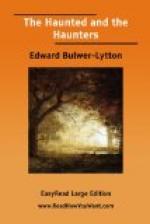Ye maun have heard of Sir Robert Redgauntlet of that Ilk, who lived in these parts before the dear years. The country will lang mind him; and our fathers used to draw breath thick if ever they heard him named. He was out wi’ the Hielandmen in Montrose’s time; and again he was in the hills wi’ Glencairn in the saxteen hundred and fifty-twa; and sae when King Charles the Second came in, wha was in sic favour as the Laird of Redgauntlet? He was knighted at Lonon court, wi’ the King’s ain sword; and being a redhot prelatist, he came down here, rampauging like a lion, with commissions of lieutenancy (and of lunacy, for what I ken), to put down a’ the Whigs and Covenanters in the country. Wild wark they made of it; for the Whigs were as dour as the Cavaliers were fierce, and it was which should first tire the other. Redgauntlet was aye for the strong hand; and his name is kend as wide in the country as Claverhouse’s or Tam Dalyell’s. Glen, nor dargle, nor mountain, nor cave, could hide the puir hill-folk when Redgauntlet was out with bugle and bloodhound after them, as if they had been sae mony deer. And troth when they fand them, they didna mak muckle mair ceremony than a Hielandman wi’ a roebuck—It was just, “Will ye tak the test?”—if not, “Make ready—present—fire!”—and there lay the recusant.
Far and wide was Sir Robert hated and feared. Men thought he had a direct compact with Satan—that he was proof against steel—and that bullets happed aff his buff-coat like hailstanes from a hearth—that he had a mear that would turn a hare on the side of Carrifragawns[6]—and muckle to the same purpose, of whilk mair anon. The best blessing they wared on him was, “Deil scowp wi’ Redgauntlet!” He wasna a bad maister to his ain folk, though, and was weel aneugh liked by his tenants; and as for the lackies and troopers that rade out wi’ him to the persecutions, as the Whigs caa’d those killing times, they wad hae drunken themsells blind to his health at ony time.
Now you are to ken that my gudesire lived on Redgauntlet’s grund—they ca’ the place Primrose-Knowe. We had lived on the grund, and under the Redgauntlets, since the riding days, and lang before. It was a pleasant bit; and I think the air is callerer and fresher there than ony where else in the country. It’s a’ deserted now; and I sat on the broken door-cheek three days since, and was glad I couldna see the plight the place was in; but that’s a’ wide o’ the mark. There dwelt my gudesire, Steenie Steenson, a rambling, rattling chiel he had been in his young days, and could play weel on the pipes; he was famous at “Hoopers and Girders”—a’ Cumberland couldna touch him at “Jockie Lattin”—and he had the finest finger for the backlilt between Berwick and Carlisle. The like o’ Steenie wasna the sort that they made Whigs o’. And so he became a Tory, as they ca’ it, which we now ca’ Jacobites, just out of a kind of needcessity, that he might belang to some side or other. He had nae ill-will to the Whig bodies, and liked little to see the blude rin, though, being obliged to follow Sir Robert in hunting and hosting, watching and warding, he saw muckle mischief, and maybe did some, that he couldna avoid.




